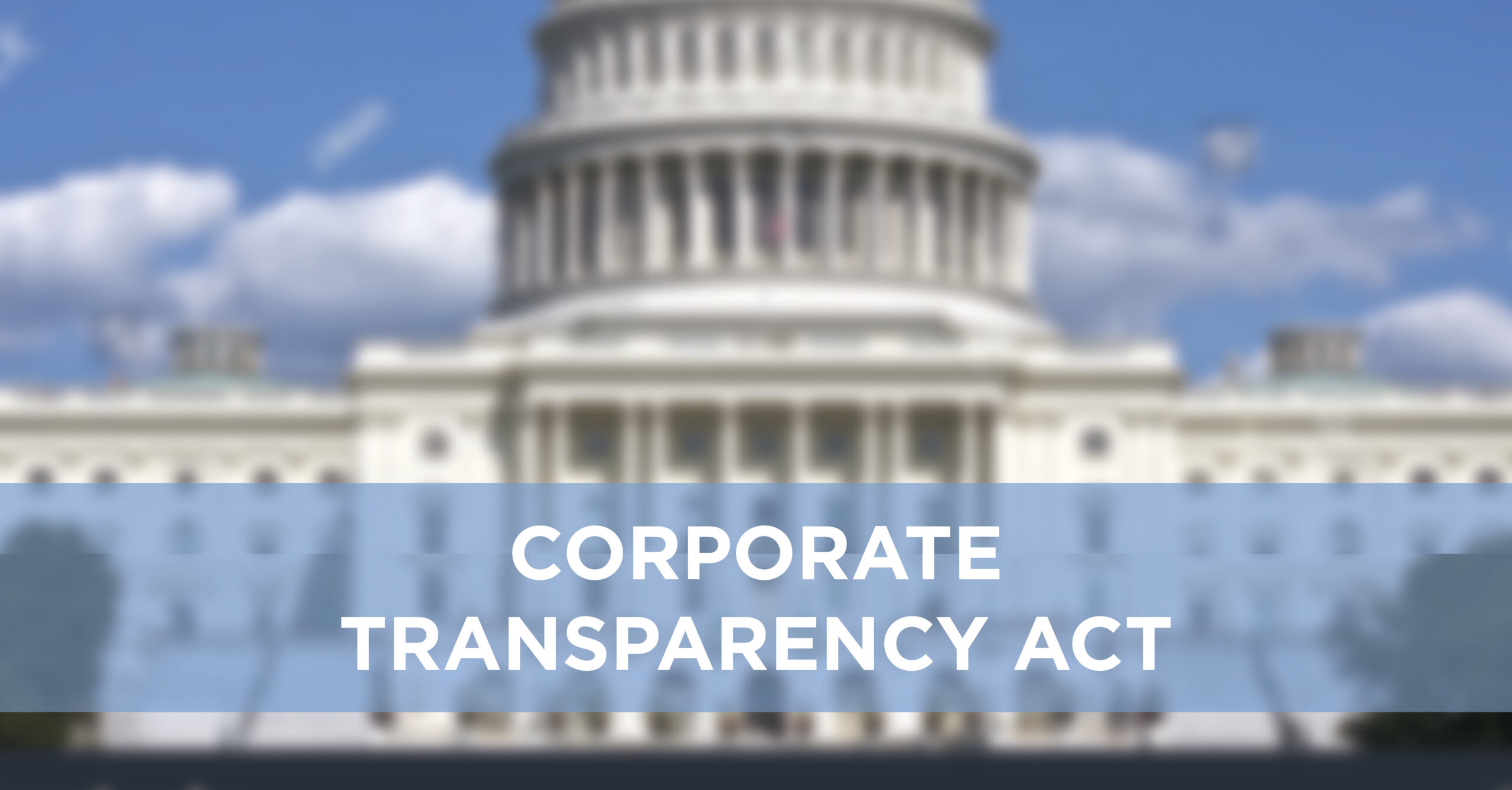The Corporate Transparency Act (CTA) was established to help combat terrorism, money laundering, tax abuse, and other financial crimes. Since its implementation in January 2024, litigation and administrative rulemaking related to the CTA has impacted its enforcement and scope. This page aims to provide updates on developments surrounding the CTA and its requirements for certain business entities to submit beneficial ownership information to the U.S. government.
For resources on the CTA, please visit FinCEN’s website: https://www.fincen.gov/boi.
Monroe Moxness Berg has formed a committee to track the CTA and related developments and is helping clients navigate this new law. If you would like assistance, please reach out to John Remakel at jremakel@mmblawfirm.com or Monica Pelkey at mpelkey@mmblawfirm.com, or the MMB attorney you regularly work with.
The information provided on this page is intended for educational purposes only, and is based upon information available at the time of publication. As every situation is different, it does not constitute, nor should it be treated as, legal advice regarding CTA compliance or any related legal matters.
Update: April 7, 2025
U.S. Companies and U.S. Persons Removed from Corporate Transparency Act Reporting Obligations
On March 21, 2025, the Financial Crimes Enforcement Network (FinCEN) issued an interim final rule that removes the requirement for U.S. companies and U.S. persons to report beneficial ownership information to FinCEN under the Corporate Transparency Act (CTA). The interim final rule narrows the CTA to apply only to foreign companies and their non-U.S. beneficial owners.
The interim final rule is consistent with a press release that the US Treasury Department issued on March 2, 2025 stating that no fines or penalties associated with beneficial ownership reporting under the CTA would be enforced against U.S. citizens and domestic reporting companies and their beneficial owners.
Ongoing legal challenges and state-level corporate transparency laws
FinCEN is accepting comments to the interim final rule and anticipates issuing a final rule later this year. There also remain several legal challenges to the beneficial ownership reporting requirements under the CTA and legislation has been introduced in Congress to amend or repeal the CTA altogether. There are several states, including New York, that have either adopted or are in the process of adopting their own state-level corporate transparency laws that have similar reporting obligations as the CTA.
Update: March 5, 2025
Corporate Transparency Act Enforcement Suspended
On February 27, 2025, FinCEN announced that it would not issue fines or penalties, or initiate enforcement actions related to the beneficial ownership reporting deadline of March 21, 2025, until a forthcoming interim final rule becomes effective and new reporting deadlines are established. FinCEN stated that the interim final rule will be issued no later than March 21, 2025.
On March 2, 2025, the US Treasury Department issued a press release announcing that it was suspending the enforcement of penalties and fines associated with reporting requirements under the Corporate Transparency Act for U.S. citizens and domestic reporting companies.
Monroe Moxness Berg will continue to monitor developments related to interim rules proposed by FinCEN and the US Treasury Department, in addition to any modifications made by Congress. Please consult with an attorney if you have questions about the CTA reporting requirements and for advice specific to your situation.
Update: February 25, 2025
Corporate Transparency Act Reporting Deadlines Resume
Please be advised that as of February 19, 2025, Corporate Transparency Act (CTA) reporting deadlines have been resumed as further described below.
On February 17, 2025, in the case Smith v. United States Department of Treasury, et al. (Smith), the U.S. District Court for the Eastern District of Texas stayed the nationwide injunction of the CTA pending the disposition of the appeal before the U.S. Court of Appeals for the Fifth Circuit.
The Smith preliminary injunction was the last remaining nationwide injunction that prohibited FinCEN from enforcing the CTA beneficial ownership information (BOI) reporting requirements. The result of the Smith order is that the CTA’s reporting obligations are, once again, back in effect, pending the Fifth Circuit appeal and subject to FinCEN’s deadline extensions described below.
FinCEN extends filing deadline for majority of reporting companies to March 21, 2025
FinCEN has responded to the stay of the Smith preliminary injunction by issuing a statement extending the deadline for filing initial, updated and/or corrected BOI reports for a majority of reporting companies to March 21, 2025. This extension does not impact those reporting companies that have a reporting deadline later than March 21, 2025, which later deadline under the CTA rules will continue to apply to those reporting companies.
During this thirty (30) day extension, FinCEN said it will assess its options to further modify deadlines to prioritize reporting for those entities that may be considered a national security risk. FinCEN recognizes that reporting companies may need additional time to file their BOI reports and intends to provide any further modification of the March 21st deadline in advance of the deadline. FinCEN also intends to review the BOI reporting rule in an effort to reduce the burden for small U.S. businesses and other lower-risk entities.
The Protect Small Business from Excessive Paperwork Act of 2025
There is pending legislation in the U.S. Congress, the Protect Small Business from Excessive Paperwork Act of 2025, that if adopted into law, would extend the reporting deadline to January 1, 2026, for reporting companies that existed prior to January 1, 2024. The bill unanimously passed the U.S. House of Representatives, and a companion bill has been introduced in the U.S. Senate. It is unclear if the Senate will act now to pass the bill.
The constitutionality of the CTA also remains on appeal in multiple federal circuit courts with the Fifth Circuit set to hear oral arguments on April 1, 2025 in Texas Top Cop Shop v. McHenry (Texas Top Cop Shop). The Texas Top Cop Shop case was the first case from the U.S. District Court for the Eastern District of Texas to impose a nationwide preliminary injunction against the CTA on December 3, 2024, which preliminary injunction the U.S. Supreme Court later stayed pending the Fifth Circuit appeal.
While FinCEN and/or Congress may further modify the CTA’s reporting deadlines, it is not clear if that will occur before the March 21, 2025, deadline. Please consult with an attorney if you have questions about the CTA reporting requirements and for advice specific to your situation.
Update: January 31, 2025
Impact of ongoing Litigation: Corporate Transparency Act Filing Obligations Suspended
On December 3, 2024, in the case Texas Top Cop Shop v. McHenry—formerly Texas Top Cop Shop v. Garland (Texas Top Cop Shop), a federal judge in the US District Court for the Eastern District of Texas entered a preliminary injunction enjoining the Corporate Transparency Act (CTA) and its enforcement nationwide because the Court found that the CTA is likely unconstitutional.
The U.S. Department of Justice, acting on behalf of the Treasury Department appealed the Texas Top Cop Shop decision to the Fifth Circuit Court of Appeals and ultimately to the U.S. Supreme Court, which on January 23, 2025 ruled to stay the nationwide injunction but left the merits of the appeal, including the constitutionality of the CTA, to be decided by the Fifth Circuit. The Fifth Circuit is scheduled to hear oral arguments in the Texas Top Cop Shop appeal on April 1, 2025.
In the interim, on January 7, 2025, a different federal judge in the US District Court for the Eastern District of Texas issued an order in a separate case, Smith v. United States Department of the Treasury (Smith), that applies nationwide and stays the effective date of the reporting rule under the CTA until the resolution of the Smith case. To date, the federal government has not appealed the Smith order, and the U.S. Supreme Court did not address the Smith order in its opinion staying the preliminary injunction in the Texas Top Cop Shop case.
Though not currently required, reporting companies may continue to file beneficial ownership information
FinCEN has responded to the various decisions in the Texas Top Cop Shop and Smith cases by informing reporting companies on January 24, 2025 that they are not required to file beneficial ownership information and are not subject to liability if they fail to do so while the Smith order remains in force. However, FinCEN has also indicated that reporting companies may continue to voluntarily report their beneficial ownership information to FinCEN.
It is not clear how much time will be allotted to reporting companies to again comply with their CTA reporting requirements if and when the Smith order is overturned, thereby lifting the stay for compliance, or the constitutionality of the CTA is ultimately decided in the Texas Top Cop Shop case and/or other CTA-related cases that are currently pending in other federal courts.
Please consult with an attorney if you have questions about the impact of this litigation and for advice specific to your situation.
Original Article Posted August 20, 2024
The Corporate Transparency Act: New Reporting Requirements for Many Business Entities
As of January 1, 2024, many business entities and some trusts are required to report beneficial ownership information (BOI) to the U.S. government under the new Corporate Transparency Act (CTA).
The CTA is meant to help combat terrorism, money laundering, tax abuse, and other financial crimes.
New and existing business entities that meet the CTA’s definition of a Reporting Company and that do not fall under any exemptions, will need to file information about the entity and the individuals who own and/or control the entity, with the U.S. Treasury Department’s Financial Crimes Enforcement Network (FinCEN) – through an online form available at https://www.fincen.gov/boi.
Entities created on or after January 1, 2024, will also need to submit information on company applicants.
Do the CTA reporting requirements apply to my business entity?
Entities should determine if the CTA and the new reporting requirements apply to them. The CTA applies to certain existing and new domestic and foreign corporations, LLCs, LLPs, LLLPs, most limited partnerships, and other business entities – including any entity that is created or registers by filing a document with the Secretary of State or a similar state agency. Entities required to report are called Reporting Companies.
The CTA exempts 23 types of entities that may fall under the definition of a Reporting Company. Large operating businesses that employ more than 20 full-time employees, have a physical office in the United States and have annual revenues of more than $5 million fall within one of the 23 exceptions. Many financial institutions, insurance companies, certain inactive entities, certain non-profit organizations and tax-exempt entities, and governmental authorities are exempt.
My business entity needs to comply with the CTA: What beneficial ownership information will I need to report to FinCEN?
Beneficial ownership information includes:
- Full name
- Residential address
- Birthdate
- FinCEN Identification number or other acceptable identification document such as a passport or U.S. driver’s license, and the name of the issuing state or jurisdiction of the identification document. An image of the document must also be submitted.
When do I need to submit beneficial ownership information?
Entities formed on or after January 1, 2024, will need to report BOI and company applicant information within 90 days of the entity’s formation date. On and after January 1, 2025, new entities will need to report within 30 days of the entity’s formation date.
Entities formed prior to January 1, 2024, will have until January 1, 2025 to report BOI.
Please note that the obligation to report BOI will be an ongoing requirement, which means if the Reporting Company or a beneficial owner changes their name or residential address, the BOI needs to be updated with FinCEN.
Businesses and their controlling owners who are required but fail to report complete or updated BOI or who report false or fraudulent information can face significant civil penalties of up to $500 per day and/or criminal penalties of up to $10,000 in fines and/or imprisonment of up to 2 years.
FinCEN Resources
For more information, please access the resources provided on the FinCEN website.


